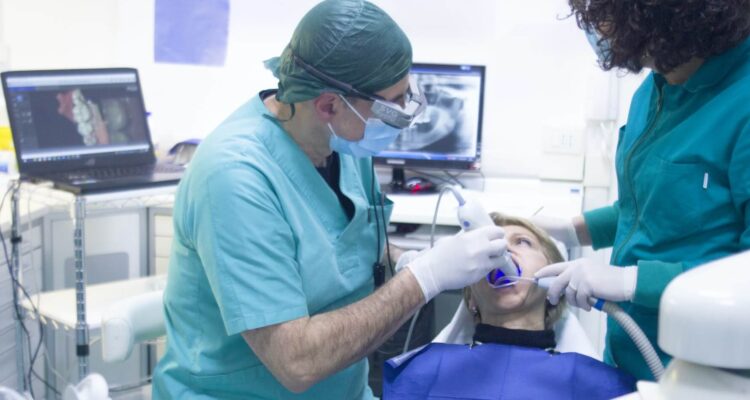We make numerous facial gestures every day without thinking, including smiling, laughing, chatting, chewing. However, if you have a temporomandibular joint disorder (TMD), these simple activities may cause you significant discomfort. While most TMD symptoms go away in a few weeks to months, some severe ailments might be exacerbated by certain actions or habits. Besides opting for TMJ treatment in Albuquerque, here are some things you can do to reduce TMJ pain:
Minimize Jaw Movements:
To help with TMJ discomfort, avoid wide jaw movements like chewing, yawning, singing, and shouting whenever possible. Make an effort to keep your muscles relaxed, in order to minimize pain.
Get Enough Sleep:
Sleeping is essential for a number of aspects of excellent health. Sleep on your back with pillows to support your neck to help minimize TMJ discomfort. Avoid sleeping on your stomach, and if you must sleep on your side, do not put your hand near your jaw.
Maintain a Good Posture:
According to a TMJ dentist in Albuquerque, being seated in an improper position for hours can cause you to experience greater discomfort in your jaw. Choose a chair with back support and take frequent rests to improve your posture while working. Set your seat as upright as possible when driving, and keep it that way while doing leisure activities such as watching TV or reading. What you can do is to sit upright with a pillow placed behind your back for support.
Try to Minimize Stress:
To help loosen and relax your jaw, consider using mediation techniques. Yoga routines can also aid to decrease muscular tension while also relaxing your face.
Practice Jaw Exercises:
Jaw exercises do help with improving mobility in your joints. Stretch exercises, relaxation exercises, and Strengthening exercises are three types of exercises you can learn for proper pain management.
Avoid Everyday Bad Habits:
Some of the following habits will only contribute to TMJ pain:
- Teeth grinding
- Clenching of teeth
- Biting tails
- Resting the jaw in your hand
Ask a TMJ specialist in Albuquerque what activities should be avoided to protect your jaw. Make a note of how often you do any of these activities and let them know about it.
Ice Packs:
Ice packs, when applied correctly, can numb pain, bring down inflammation, and facilitate the healing of aching joints at the same time. Apply an ice pack using a cloth on the area where you feel pain. But, for optimum results, apply it every ten to fifteen minutes on the affected area.
Acupuncture:
Acupuncture is frequently used by a physical therapist to treat TMJ pain because it relieves the discomfort and pain right at the source of the problem. Acupuncture can help with muscular strain, tension, system imbalances as well as TMJ disorder, in addition to reducing pain and discomfort.
TMD and dental concerns go hand-in-hand. If you do teeth grinding on a regular basis, your enamel can be worn away, causing pain in the jaw muscle and tooth sensitivity. So, maintain excellent oral health at all times. To treat oral problems on time, see your dentist on a regular basis. After analyzing your condition, the expert will let you know if TMJ treatment in Albuquerque is required.



